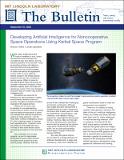| dc.date.accessioned | 2023-10-05T18:00:45Z | |
| dc.date.available | 2023-10-05T18:00:45Z | |
| dc.date.issued | 2023-10-05 | |
| dc.identifier.uri | https://hdl.handle.net/1721.1/152377 | |
| dc.description.abstract | With nearly 9,000 active and inactive satellites in orbit, space has become more crowded and competitive than ever before. Solving nascent problems in this domain — such as avoiding collision with debris or servicing malfunctioning satellites — requires more than just knowledge of orbital mechanics and spacecraft control.
In the popular video game Kerbal Space Program (KSP), a team at the Laboratory saw a sophisticated multi-physics simulator capable of modeling all aspects of the aerospace domain. The team used the game engine to develop an open-source library and challenge suite, Kerbal Space Program Differential Games (KSPDG), designed to spur development of AI for a wide range of problems within the orbital domain. | en_US |
| dc.language.iso | en_US | en_US |
| dc.relation.ispartofseries | The Bulletin; | |
| dc.rights | Attribution-NoDerivs 3.0 United States | * |
| dc.rights.uri | http://creativecommons.org/licenses/by-nd/3.0/us/ | * |
| dc.title | Developing Artificial Intelligence for Noncooperative Space Operations Using Kerbal Space Program | en_US |
| dc.type | Article | en_US |
